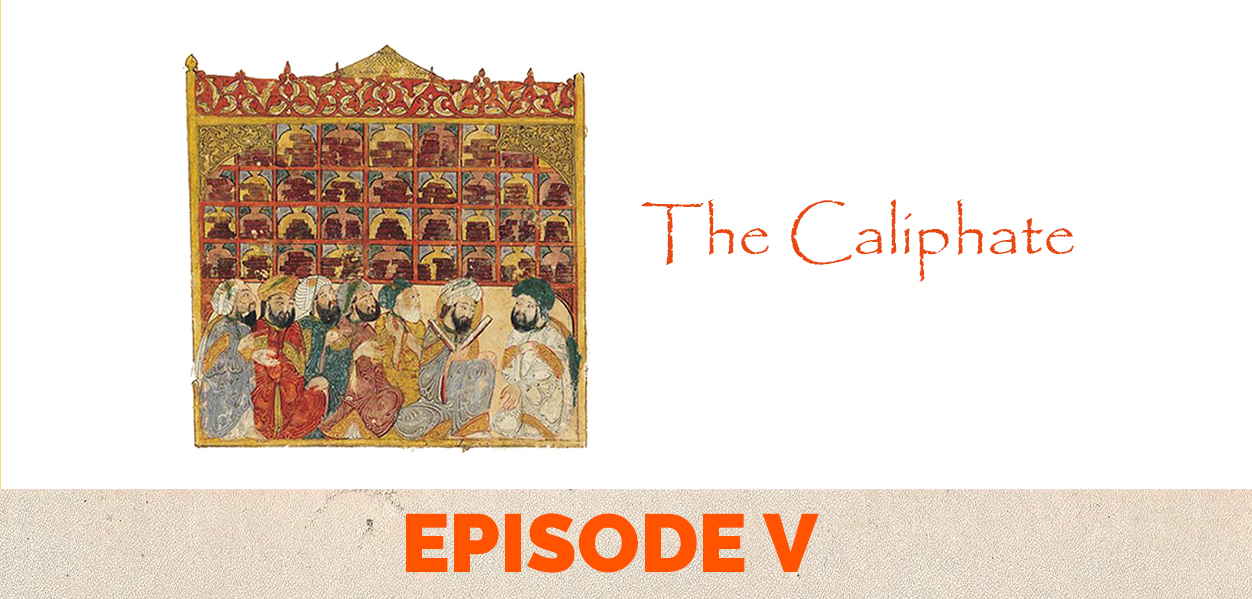Why did the medieval Abbasid Caliphs have almost all ancient Greek works of philosophy and science translated into Arabic? How did the long list of medieval Muslim polymaths reconcile abstract reasoning with Islamic doctrine?
Who were the radical freethinkers that rejected revealed religion in favor of reason in a society where apostasy and heresy were punishable by death?
And why are developments in the 11th century crucial to understanding modern controversies over blasphemy and apostasy, such as the Salman Rushdie affair and the attack on Charlie Hebdo?
Find out in episode 5 of Clear and Present Danger: A History of Free Speech. The Caliphate
You can subscribe and listen to Clear and Present Danger on iTunes, Google Play, YouTube, TuneIn and Stitcher, or download episodes directly from SoundCloud.
Stay up to date with Clear and Present Danger on the show’s Facebook and Twitter pages, or email us feedback at freespeechhistory@gmail.com.
Literature: Episode 5
- Abbas, S.B. (2013): Pakistan’s Blasphemy Laws: From Islamic Empires to the Taliban. Austin, TX: University of Texas Press.
- Adamson, P.: On Razi. [Forthcoming].
- Ames, C.C. (2015): Medieval Heresies: Christianity, Judaism, and Islam. Cambridge, UK: Cambridge University Press.
- Cook, D. (2006): “Apostasy from Islam: A Historical Perspective” in: Jerusalem Studies in Arabic and Islam 31. Pp. 248-288.
- Cook, M. (2013): ”Is political freedom an Islamic value?” in: Skinner, Q. & van Gelderen, M. (eds.): Freedom and the Construction of Europe vol 2: Volume 2: Free Persons and Free States. Cambridge, UK: Cambridge University Press.
- Cooperson, M. (2001): “Two Abbasid trials: Ahmad Ibn Hanbal and Hunayn b. Ishāq” in: Al-Qantara XXH 2. Pp. 375-393.
- Friedmann, Y. (2006): Tolerance and Coercion in Islam: Interfaith Relations in the Muslim Tradition. Cambridge, UK: Cambridge University Press.
- Griffel, F. (2001): “Toleration and Exclusion: Al-Shāfiʾī and al-Ghazālī on the Treatment of Apostates” in: Bulletin of the School of Oriental and African Studies 64(3). University of London. Pp. 339–354.
- Griffel, F. (2009): Al-Ghazali’s Philosophical Theology. Oxford, UK: Oxford University Press.
- Gutas, D. (1998): Greek Thought, Arabic Culture: The Graeco-Arabic Translation Movement in Baghdad and Early ‘Abbasaid Society (2nd-4th/5th-10th c.). Routledge.
- Hanne, E.J. (2007): Putting the Caliph in His Place: Power, Authority, and the Late Abbasid Caliphate. Fairleigh Dickinson University Press.
- Hoyland, R.G. (2014): In God’s Path: The Arab Conquests and the Creation of an Islamic Empire. Oxford, UK: Oxford University Press.
- Ibrahim, M. (1994): ”Religious Inquisition as Social Policy: The Persecution of the Zanadiqa in the Early Abbasid Caliphate” in: Arab Studies Quarterly 16(2). London, UK. Pp. 53.
- Judd, S. (2011): ”Muslim Persecution of Heretics during the Marwānid Period (64–132/684–750) in: Al-Masāq Journal of the Medieval Mediterranean 23(1). 1-14.
- Kamali, M.H. (1995): Freedom of Expression in Islam. Cambridge, UK: The Islamic Texts Society.
- Kennedy, H. (2015): The Prophet and the Age of the Caliphates: The Islamic Near East from the sixth to the eleventh century. 3rd Taylor and Francis.
- Knysh, A. (1993): ““Orthodoxy” and “Heresy” in Medieval Islam: An Essay in Reassessment” in: The Muslim World 83(1). Pp. 48–67.
- Kraemer, J.L. (1984): ”Humanism in the Renaissance of Islam: A Preliminary Study” in: Journal of the American Oriental Society 104(1), Studies in Islam and the Ancient Near East Dedicated to Franz Rosenthal. 135-164.
- Lewis, B. (1953): ”Some Observations on the Significance of Heresy in the History of Islam” in: Studia Islamica 1. Maisonneuve & Larose Stable. Pp. 43-63.
- Lewis, B. (2003): What Went Wrong?: The Clash Between Islam and Modernity in the Middle East. Harper Perennial.
- Najjar, F.M. (1980): ”Democracy in Islamic Political Philosophy” in: Studia Islamica 51. 107–122.
- Peters, R. & De Vries, G.J.J. (1976–77): ”Apostasy in Islam” in: Die Welt des Islams, New Series 17(1/4). 1–25.
- Pipes, D. (2003): The Rushdie Affair: The Novel, the Ayatollah, and the West.
- Packer, G.: The Moderate Martyr – A radically peaceful vision of Islam. The New Yorker. Available at: https://www.newyorker.com.
- Robinson, C.F. (ed.): New Cambridge History of Islam, vol. 1: The Formation of the Islamic World, Sixth to Eleventh Centuries. 7.
- Soage, A.B. (2007): ”Faraj Fawda, or the Cost of Freedom of Expression” in: Middle East Review of International Affairs 11(2).
- Staikos, K.P. (2007): The History of the Library in Western Civilization. New Castle, DE: Oak Knoll Press.
- Starr, S.F. (2015): Lost Enlightenment: Central Asia’s Golden Age from the Arab Conquest to Tamerlane. Princeton, NJ: Princeton University Press.
- Stroumsa, S. (1999): Freethinkers of Medieval Islam: Ibn Al-Rawāndī, Abū Bakr Al-Rāzī and Their Impact on Islamic Thought.
- Stroumsa, S. & al-Rāwandī, I. (1994): ”The blinding emerald: Ibn al-Rawandi’s ‘Kitab al-Zumurrud” In: Journal of the American Oriental Society 114.
- Tholib, U. (2002): The reign of the caliph al -Qādir billāh (381 /991–422 /1031). McGill University (Canada), ProQuest Dissertations Publishing. NQ85747. Pp. 258-259
- Young, M.J.L., Latham, J.D. & Serjeant, R.B. (eds.) (2006): Religion, Learning and Science in the ‘Abbasid Period. Cambridge, UK: Cambridge University Press.
Online sources
- Definition of Source: The Oxford Dicionary of Islam. Available at: http://www.oxfordislamicstudies.com
- The Mysterious Fate of the Great Library of Alexandria. Available at: http://www.bede.org.uk
- Peter Adamson, The History of Philosophy without any Gaps episodes 120 – 145 https://www.historyofphilosophy.net

